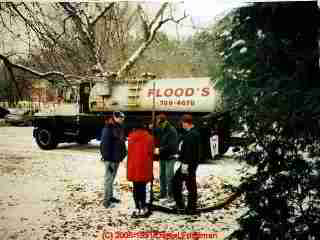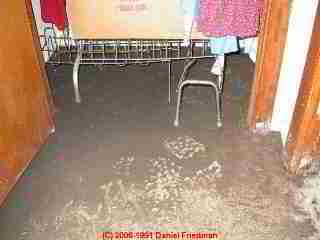 Septic Tank or System Drain Backup
Septic Tank or System Drain Backup
due to Heavy Use or Area Flooding: Prevention Methods
- POST a QUESTION or COMMENT about how to avoid septic system or sewer line backups
Septic or sewer backup prevention:
This document explains how to avoid septic system backups when heavy use of the system is anticipated and for homes connected to a municipal sewer we discuss how to prevent sewer or storm drain backups into a building during rain or heavy flooding.
InspectAPedia tolerates no conflicts of interest. We have no relationship with advertisers, products, or services discussed at this website.
- Daniel Friedman, Publisher/Editor/Author - See WHO ARE WE?
Guide to Avoiding Septic Backups During Heavy System Use
 I bought a home in August 2007 that uses a 2000 gallon Septic Tank. At that time, it was inspected, possibly pumped out and was in fine working order. We are a family of 4 and for us, we’ve had no problems.
I bought a home in August 2007 that uses a 2000 gallon Septic Tank. At that time, it was inspected, possibly pumped out and was in fine working order. We are a family of 4 and for us, we’ve had no problems.
On occasion, we have maybe 8 people visit at a given time. We are expecting about 60-70 people over for a Birthday Party and my husband is freaking out!
He thinks the septic tank will back up into the drains if we have that many people using the toilets, over a 6 hour period. My question is: Is my husband correct in thinking that way, will the septic system back up? Could you PLEASE answer these questions AS SOON AS POSSIBLE? The party is on 04/26/08.
Why Does the Septic System Back Up During a Party?
Indeed it seems to be just the luck that we are living happily along not giving the septic tank a thought until we have a bunch of guests over for Thanksgiving, Chanukah, Christmas, or a graduation party. Why is it that at events we often see the septic system backing up?
The explanation is that a septic system that backs up during a party was already in trouble, but our usage was modest enough that we just weren't noticing it. The surge of waste water entering the septic tank cannot flow into a flooded drainfield so sewage may back up into the home, usually at the lowest plumbing fixture.
Sometimes it's not the wastewater surge but someone flushing something down a toilet that blocks a drain - that's a problem that can be cleared by a plumber using a plumbing snake or drain router. But often the problem is in the septic field itself.
Here are some simple tips for avoiding a septic backup during times of surges in use such as during a party
- Pump the septic tank before the party: When a septic system is otherwise in good working condition, the septic system stress created by having many people use the sinks, showers, and toilets over a short time is not so much the solid waste as the high wastewater volume in gallons.
Very high water usage over a short time can flood a drainfield or septic mound which in turn could cause a septic backup. Pump the septic tank tank right before the event, or the day before. This will give some extra capacity to absorbing this high use resulting in a sudden surge in wastewater volume. - Avoid using water unnecessarily after pump out. That means don't leave running toilets un-repaired, don't leave water running unnecessarily.
See WATER QUANTITY USAGE TABLES for a table of typical daily residential water usage under normal conditions. - See TOILETS, DON'T FLUSH LIST for a list of things that should not be flushed into a septic system: a list of what's ok and what's not ok to put into septic tanks and building drains.Some of these can cause a system drain blockage and thus a sewage backup into the home.
- Regular septic system maintenance, pumping on schedule, is the long term way to protect the system tank and drainfield from early failure and thus to protect from septic system backups.
See SEPTIC CLEARANCE DISTANCES and
see Ten Steps to Keeping a Septic System Working for a more thorough discussion of how to care for a septic system, or review our complete list of septic maintenance articles
at SEPTIC SYSTEM CARE GUIDE - See BLOCKED DRAIN REPAIR METHODS for simple methods to clear a blocked drain yourself.
- Provide additional or emergency toilets when an unusually large group of people are expected at a site served only by a normal residential septic system, consider renting one or more port-a-potty toilets from a local supplier.
This is an especially good idea if you already know that your septic system is old, failure prone, and/or of limited capacity.
See CAMPING & EMERGENCY TOILETS.
How Much Wastewater Will Be Produced by 60 Visitors During a Party?
In the email example above where our writer assumed there would be up to 70 people visiting the home over a 6 our period, if every visitor uses the bathroom and at each use flushes a toilet twice, that'll be 120 x 4gals = 480 gallons which will be less than the septic tank can hold.
So if otherwise conserve water, we have a typical home septic tank of 1000 gallons or larger, and if we start our festival with the tank nearly empty, we're sure to protect the drainfield from flooding during the event.
If the septic system is already in good working order you should be ok.
If your drains are already backing up, especially during a time of heavy use such as with guests in the home,
see SEPTIC BACKUP REPAIR.
If toilets are overflowing or not flushing,
see TOILET OVERFLOW EMERGENCY.
Guide to Preventing Septic or Sewer Backups Due to Flooding or Sewer Main Backups
Please see our full article on this topic, found
at SEWER BACKUP PREVENTION
...
Continue reading at BACKWATER VALVES, SEWER LINE or select a topic from the closely-related articles below, or see the complete ARTICLE INDEX.
Or see BACKUP PREVENTION, SEPTIC FAQs - questions & answers posted originally at this page
Or see these
Septic or Sewer Backup Articles
- ADDITIVES / TREATMENTS for SEPTIC SYSTEMS
- BACKUP, SEPTIC-SEWAGE WHAT TO DO
- BACKUP PREVENTION, SEPTIC
- BACKUP PREVENTION, SEWER LINE
- BLOCKED DRAIN REPAIR METHODS
- DRAINFIELD FAILURE DIAGNOSIS
- SEWAGE BACKUP TEST & CLEANUP
- SEWAGE BACKUP PREVENTION - home
- SEWAGE CLEANUP PROCEDURES & STANDARDS
- SEWAGE CONTAMINATION in BUILDINGS
- SEWAGE EJECTOR / GRINDER PUMPS
Suggested citation for this web page
BACKUP PREVENTION, SEPTIC at InspectApedia.com - online encyclopedia of building & environmental inspection, testing, diagnosis, repair, & problem prevention advice.
Or see this
INDEX to RELATED ARTICLES: ARTICLE INDEX to SEPTIC SYSTEMS
Or use the SEARCH BOX found below to Ask a Question or Search InspectApedia
Ask a Question or Search InspectApedia
Try the search box just below, or if you prefer, post a question or comment in the Comments box below and we will respond promptly.
Search the InspectApedia website
Note: appearance of your Comment below may be delayed: if your comment contains an image, photograph, web link, or text that looks to the software as if it might be a web link, your posting will appear after it has been approved by a moderator. Apologies for the delay.
Only one image can be added per comment but you can post as many comments, and therefore images, as you like.
You will not receive a notification when a response to your question has been posted.
Please bookmark this page to make it easy for you to check back for our response.
IF above you see "Comment Form is loading comments..." then COMMENT BOX - countable.ca / bawkbox.com IS NOT WORKING.
In any case you are welcome to send an email directly to us at InspectApedia.com at editor@inspectApedia.com
We'll reply to you directly. Please help us help you by noting, in your email, the URL of the InspectApedia page where you wanted to comment.
Citations & References
In addition to any citations in the article above, a full list is available on request.
- Thanks to reader - (Anonymous by request) for discussing alternative preventive measures to stop basement drain and toilet backup prevention - July 2010
- Backwater Valve Supply Co., Akron, OH, Tel: 330.836.9393, Email: Help@Backwater-Valves.com, website www.backwater-valves.com/Backwater-Valve-Diagram.asp has a good sketch that is their basis for recommending when a sewer backup prevention valve is needed. Web search 07/10/2010 - original source: www.backwater-valves.com. Quoting from the company:
Many municipal Building Codes require you to have a backwater valve if your plumbing fixtures are below the top of the first upstream manhole on your street. A properly operating backwater valve allows flow to only go in one direction (out), preventing wastewater from entering your building during regular sewer system maintenance or accidental sewer system backups. To find out if you have or need a backwater valve, check your plumbing plans or consult with your builder or a professional plumber. Remember, if sewage backs up into your home, the cost to repair damages and clean up the mess will be well high than the cost to install a valve. Laws allow that towns and municipalities cannot be held liable for damages when a backwater valve has not been installed by a property owner.
Classification: Type I – intended for use in horizontal pipe runs to floor drains, building drains, sewers, holding tanks, etc.
Application: Backwater valves should be used in building drainage systems whenever a risk of flooding due to sewer surcharge, back up, or failure exists.
Backwater valves must be installed to ensure access for inspection or maintenance.
Periodic inspection is important to maintain satisfactory performance of the backwater valve.
The building owner must maintain and keep backwater valves in proper working order. - Our recommended books about building & mechanical systems design, inspection, problem diagnosis, and repair, and about indoor environment and IAQ testing, diagnosis, and cleanup are at the InspectAPedia Bookstore. Also see our Book Reviews - InspectAPedia.
- In addition to citations & references found in this article, see the research citations given at the end of the related articles found at our suggested
CONTINUE READING or RECOMMENDED ARTICLES.
- Carson, Dunlop & Associates Ltd., 120 Carlton Street Suite 407, Toronto ON M5A 4K2. Tel: (416) 964-9415 1-800-268-7070 Email: info@carsondunlop.com. Alan Carson is a past president of ASHI, the American Society of Home Inspectors.
Thanks to Alan Carson and Bob Dunlop, for permission for InspectAPedia to use text excerpts from The HOME REFERENCE BOOK - the Encyclopedia of Homes and to use illustrations from The ILLUSTRATED HOME .
Carson Dunlop Associates provides extensive home inspection education and report writing material. In gratitude we provide links to tsome Carson Dunlop Associates products and services.

